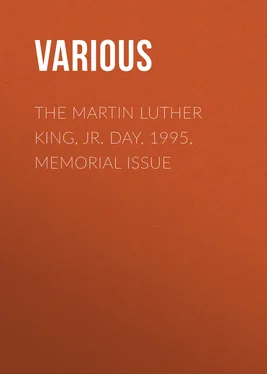Various - The Martin Luther King, Jr. Day, 1995, Memorial Issue
Здесь есть возможность читать онлайн «Various - The Martin Luther King, Jr. Day, 1995, Memorial Issue» — ознакомительный отрывок электронной книги совершенно бесплатно, а после прочтения отрывка купить полную версию. В некоторых случаях можно слушать аудио, скачать через торрент в формате fb2 и присутствует краткое содержание. Жанр: foreign_prose, История, foreign_edu, foreign_antique, на английском языке. Описание произведения, (предисловие) а так же отзывы посетителей доступны на портале библиотеки ЛибКат.
- Название:The Martin Luther King, Jr. Day, 1995, Memorial Issue
- Автор:
- Жанр:
- Год:неизвестен
- ISBN:нет данных
- Рейтинг книги:3 / 5. Голосов: 1
-
Избранное:Добавить в избранное
- Отзывы:
-
Ваша оценка:
- 60
- 1
- 2
- 3
- 4
- 5
The Martin Luther King, Jr. Day, 1995, Memorial Issue: краткое содержание, описание и аннотация
Предлагаем к чтению аннотацию, описание, краткое содержание или предисловие (зависит от того, что написал сам автор книги «The Martin Luther King, Jr. Day, 1995, Memorial Issue»). Если вы не нашли необходимую информацию о книге — напишите в комментариях, мы постараемся отыскать её.
The Martin Luther King, Jr. Day, 1995, Memorial Issue — читать онлайн ознакомительный отрывок
Ниже представлен текст книги, разбитый по страницам. Система сохранения места последней прочитанной страницы, позволяет с удобством читать онлайн бесплатно книгу «The Martin Luther King, Jr. Day, 1995, Memorial Issue», без необходимости каждый раз заново искать на чём Вы остановились. Поставьте закладку, и сможете в любой момент перейти на страницу, на которой закончили чтение.
Интервал:
Закладка:
"W'en Tenie got quiet' down, so she could be 'lowed ter go 'roun' de plantation, she up'n tole her marster all erbout Sandy en de pine-tree; en w'en Mars Marrabo hearn it, he 'lowed she wuz de wuss 'stracted nigger he eber hearn of. He didn' know w'at ter do wid Tenie: fus' he thought he'd put her in de po'-house; but finely, seein' ez she didn' do no harm ter nobody ner nuffin', but des went roun' moanin', en groanin', en shakin' her head, he 'cluded ter let her stay on de plantation en nuss de little nigger chilluns w'en dey mammies wuz ter wuk in de cotton-fiel'.
"De noo kitchen Mars Marrabo buil' wuzn' much use, fer it hadn' be'n put up long befo' de niggers 'mence' ter notice quare things erbout it. Dey could hear sump'n moanin' en groanin' 'bout de kitchen in de night-time, en w'en de win' would blow dey could hear sump'n a-hollerin' en sweekin' lack hit wuz in great pain en sufferin'. En hit got so atter a w'ile dat hit wuz all Mars Marrabo's wife could do ter git a 'ooman ter stay in de kitchen in de daytime long ernuff ter do de cookin'; en dey wa'n't naer nigger on de plantation w'at wouldn' rudder take forty dan ter go 'bout dat kitchen atter dark,—dat is, 'cep'n Tenie; she didn' pear ter mine de ha'nts. She useter slip 'roun' at night, en set on de kitchen steps, en lean up agin de do'-jamb, en run on ter herse'f wid some kine er foolishness w'at nobody couldn' make out; fer Mars Marrabo had th'eaten' ter sen' her off'n de plantation ef she say anything ter any er de yuther niggers 'bout de pine-tree. But somehow er nudder de niggers foun' out all 'bout it, en dey knowed de kitchen wuz ha'anted by Sandy's sperrit. En bimeby hit got so Mars Marrabo's wife herse'f wuz skeered ter go out in de yard atter dark.
"W'en it come ter dat, Mars Marrabo tuk 'n' to' de kitchen down, en use' de lumber fer ter buil' dat ole school-'ouse w'at youer talkin' 'bout pullin' down. De school-'ouse wuzn' use' 'cep'n' in de daytime, en on dark nights folks gwine 'long de road would hear quare soun's en see quare things. Po' ole Tenie useter go down dere at night, en wander 'roun' de school-'ouse; en de niggers all 'lowed she went fer ter talk wid Sandy's sperrit. En one winter mawnin', w'en one er de boys went ter school early fer ter start de fire, w'at should he fine but po' ole Tenie, layin' on de flo', stiff, en cole, en dead. Dere didn' 'pear ter be nuffin' pertickler de matter wid her,—she had des grieve' herse'f ter def fer her Sandy. Mars Marrabo didn' shed no tears. He thought Tenie wuz crazy, en dey wa'n't no tellin' w'at she mout do nex'; en dey ain' much room in dis worl' fer crazy w'ite folks, let 'lone a crazy nigger.
"Hit wa'n't long atter dat befo' Mars Marrabo sole a piece er his track er lan' ter Mars Dugal' McAdoo,—MY ole marster,—en dat's how de ole school-house happen to be on yo' place. W'en de wah broke out, de school stop', en de ole school-'ouse be'n stannin' empty ever sence,—dat is, 'cep'n' fer de ha'nts. En folks sez dat de ole school-'ouse, er any yuther house w'at got any er dat lumber in it w'at wuz sawed out'n de tree w'at Sandy wuz turnt inter, is gwine ter be ha'nted tel de las' piece er plank is rotted en crumble' inter dus'."
Annie had listened to this gruesome narrative with strained attention.
"What a system it was," she exclaimed, when Julius had finished, "under which such things were possible!"
"What things?" I asked, in amazement. "Are you seriously considering the possibility of a man's being turned into a tree?"
"Oh, no," she replied quickly, "not that;" and then she added absently, and with a dim look in her fine eyes, "Poor Tenie!"
We ordered the lumber, and returned home. That night, after we had gone to bed, and my wife had to all appearances been sound asleep for half an hour, she startled me out of an incipient doze by exclaiming suddenly,—
"John, I don't believe I want my new kitchen built out of the lumber in that old school-house."
"You wouldn't for a moment allow yourself," I replied, with some asperity, "to be influenced by that absurdly impossible yarn which Julius was spinning to-day?"
"I know the story is absurd," she replied dreamily, "and I am not so silly as to believe it. But I don't think I should ever be able to take any pleasure in that kitchen if it were built out of that lumber. Besides, I think the kitchen would look better and last longer if the lumber were all new."
Of course she had her way. I bought the new lumber, though not without grumbling. A week or two later I was called away from home on business. On my return, after an absence of several days, my wife remarked to me,—
"John, there has been a split in the Sandy Run Colored Baptist Church, on the temperance question. About half the members have come out from the main body, and set up for themselves. Uncle Julius is one of the seceders, and he came to me yesterday and asked if they might not hold their meetings in the old school-house for the present."
"I hope you didn't let the old rascal have it," I returned, with some warmth. I had just received a bill for the new lumber I had bought.
"Well," she replied, "I could not refuse him the use of the house for so good a purpose."
"And I'll venture to say," I continued, "that you subscribed something toward the support of the new church?"
She did not attempt to deny it.
"What are they going to do about the ghost?" I asked, somewhat curious to know how Julius would get around this obstacle.
"Oh," replied Annie, "Uncle Julius says that ghosts never disturb religious worship, but that if Sandy's spirit SHOULD happen to stray into meeting by mistake, no doubt the preaching would do it good."
DAVE'S NECKLISS by Charles W. Chesnutt
"Have some dinner, Uncle Julius?" said my wife.
It was a Sunday afternoon in early autumn. Our two women-servants had gone to a camp-meeting some miles away, and would not return until evening. My wife had served the dinner, and we were just rising from the table, when Julius came up the lane, and, taking off his hat, seated himself on the piazza.
The old man glanced through the open door at the dinner-table, and his eyes rested lovingly upon a large sugar-cured ham, from which several slices had been cut, exposing a rich pink expanse that would have appealed strongly to the appetite of any hungry Christian.
"Thanky, Miss Annie," he said, after a momentary hesitation, "I dunno ez I keers ef I does tas'e a piece er dat ham, ef yer'll cut me off a slice un it."
"No," said Annie, "I won't. Just sit down to the table and help yourself; eat all you want, and don't be bashful."
Julius drew a chair up to the table, while my wife and I went out on the piazza. Julius was in my employment; he took his meals with his own family, but when he happened to be about our house at meal-times, my wife never let him go away hungry.
I threw myself into a hammock, from which I could see Julius through an open window. He ate with evident relish, devoting his attention chiefly to the ham, slice after slice of which disappeared in the spacious cavity of his mouth. At first the old man ate rapidly, but after the edge of his appetite had been taken off he proceeded in a more leisurely manner. When he had cut the sixth slice of ham (I kept count of them from a lazy curiosity to see how much he COULD eat) I saw him lay it on his plate; as he adjusted the knife and fork to cut it into smaller pieces, he paused, as if struck by a sudden thought, and a tear rolled down his rugged cheek and fell upon the slice of ham before him. But the emotion, whatever the thought that caused it, was transitory, and in a moment he continued his dinner. When he was through eating, he came out on the porch, and resumed his seat with the satisfied expression of countenance that usually follows a good dinner.
"Julius," I said, "you seemed to be affected by something, a moment ago. Was the mustard so strong that it moved you to tears?"
Читать дальшеИнтервал:
Закладка:
Похожие книги на «The Martin Luther King, Jr. Day, 1995, Memorial Issue»
Представляем Вашему вниманию похожие книги на «The Martin Luther King, Jr. Day, 1995, Memorial Issue» списком для выбора. Мы отобрали схожую по названию и смыслу литературу в надежде предоставить читателям больше вариантов отыскать новые, интересные, ещё непрочитанные произведения.
Обсуждение, отзывы о книге «The Martin Luther King, Jr. Day, 1995, Memorial Issue» и просто собственные мнения читателей. Оставьте ваши комментарии, напишите, что Вы думаете о произведении, его смысле или главных героях. Укажите что конкретно понравилось, а что нет, и почему Вы так считаете.












